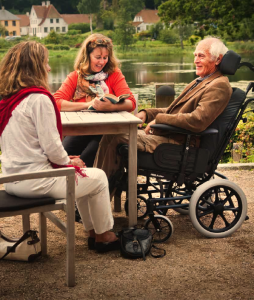As individuals age, they may require the use of a wheelchair to help them move around safely and independently. Wheelchairs not only offer mobility assistance but also play a vital role in enhancing the daily living and overall well-being of elderly adults.
With the right support and care from family members, older adults in wheelchairs can continue to live happy, fulfilling, and independent lives.
In this article, we will explore the vital role that family members and caregivers play in supporting elderly adults with wheelchairs. From practical tips on navigating their daily living tasks to emotional support, we will cover everything you need to know to ensure your loved ones feel comfortable and confident with their wheelchair.
So, whether you’re a caregiver looking for guidance or a family member wanting to help your disability- ageing loved one, let’s dive in and explore how we can make life with a family member in a wheelchair a positive and rewarding experience.
Physical Support
Providing physical support to elderly wheelchair users involves several key considerations to ensure their comfort, safety, and well-being. Here are some tips:
Assist with transfers
Helping an elderly family member in and out of the wheelchair when necessary can be a massive help. You want to make sure you are using the proper techniques as advised by a doctor or occupational therapist to avoid injury to yourself or the person in the wheelchair.
Provide Mobility Support
Push the wheelchair when needed, ensuring that the wheels are secure and moving smoothly. If the person is using an electric wheelchair, make sure it is charged and in good working order.
Ensure Comfort
Check the seating position and make adjustments as necessary, such as adding cushions or footrests to improve comfort and reduce the risk of pressure sores.

Promote Safety
Be aware of the surroundings and potential hazards, such as uneven surfaces or obstacles that could cause the wheelchair to tip over. Ensure that the wheelchair is secured properly when not in use.
Encourage Independence
Allow the person to perform tasks that they can manage on their own, such as transferring to and from the wheelchair, pushing the wheelchair when possible, and navigating their environment.
Encourage Exercise
Regular exercise is crucial for people in a wheelchair as it offers numerous benefits, including the health of the joint capsule. The joint capsule is a protective structure that surrounds joints, such as the hips, knees, and shoulders, and is composed of connective tissues that provide stability and support. Regular exercise helps to maintain joint flexibility, muscle strength and, and mobility, which are essential for healthy joints.
For elderly users of wheelchairs, exercise can help to improve mobility and prevent joint stiffness and muscle atrophy, which can result from prolonged sitting. Engaging in appropriate exercises, such as range-of-motion exercises and resistance training, can help improve muscle strength and flexibility keeping the joint capsule healthy and reducing the risk of joint pain, discomfort, and stiffness.
Exercise also promotes better circulation, which helps deliver oxygen and nutrients to the joint tissues, including the joint capsule, aiding in tissue repair and maintenance. Additionally, regular exercise can help manage weight, which is important for reducing the stress and pressure on joints, particularly weight-bearing joints such as the hips and knees, ultimately supporting the health of the joint capsule.
Furthermore, exercise has been shown to have numerous other health benefits for elderly individuals, including improved cardiovascular health, enhanced mood, increased bone density, and improved overall physical function and mobility. All of these benefits contribute to the overall well-being and quality of life of elderly users of wheelchairs, helping them maintain their independence, mobility, and joint health.
Remember to communicate openly and respectfully with the elderly individual about their preferences, comfort levels, and needs. Every individual is different, and their physical support requirements may vary. Always prioritise the safety, comfort, and well-being of the elderly person or wheelchair user, and seek professional advice when needed.
Emotional Support
When it comes to providing emotional support to an elderly person with limited mobility, it’s all about spreading some cheer and positivity!
Start by engaging in meaningful conversations and really listening to their stories, jokes, or memories with genuine interest. Share some light-hearted jokes or anecdotes to bring a smile to their face and lighten the mood.
In most cases, adjusting to life in a wheelchair can be emotionally challenging for elderly adults and research has shown that when family members and caregivers provide emotional support it can help them to cope a little better with the changes and challenges that come with having a disability.
Encouraging your loved one to pursue their hobbies or interests can also be another way to provide emotional support. Showing them that they can still do the things they once loved can be a great way to help them realise their potential. Offer words of encouragement and praise for their achievements and efforts, remind them of their strengths and capabilities and remember to be present and provide a helping hand or a hug when they need one.
Your genuine care, empathy, and positivity can make a huge difference.
Education and Advocacy
Education and advocacy might sound like serious stuff, but they’re both super important for ensuring elderly adults with wheelchairs are safe and supported. As a caregiver or family member, you can play a key role in helping the senior in your life learn the ins and outs of their wheelchair. Work with healthcare professionals and therapists to make sure they receive proper training and education on how to use their equipment safely and adapt to their new way of life.
But that’s not all! You can also be an advocate for your loved one. Speak up for their needs and rights in healthcare settings, help them access mobility equipment and resources, and guide them through complex healthcare systems. With your help, they can feel confident and empowered to live their life to the fullest in their wheelchair.
Safety and Accessibility
Creating a safe and accessible environment is crucial for ensuring the well-being of elderly adults with wheelchairs, and family members and caregivers can make a big difference in this area.
From installing grab bars and handrails to removing tripping hazards and arranging furniture for easy navigation, there are many modifications that can be made to make the home safer and more comfortable.
Ramps or lifts can also be installed to provide access to different levels of the home, allowing for greater mobility and participation in activities. Keeping the home clean and well-maintained is also important, and researching accessible transportation options and ensuring public spaces are wheelchair-friendly can help elderly adults navigate the outside world with ease. By taking these steps, family members and caregivers can ensure that the environment is conducive to the elderly adult’s safety, comfort, and independence, making a meaningful difference in their daily living.
Managing Caregiver Stress
Taking care of an elderly adult with a wheelchair can be a challenging task for family members and caregivers. It’s important to remember that self-care is equally crucial in this role. Just like putting on your own oxygen mask first on a plane, taking care of your own physical health and emotional well-being is essential to provide the best care for your loved one.
Don’t hesitate to seek support from other family members or caregivers, take breaks when needed, and even consider professional help if necessary. Remember, you’re not alone in this journey, and taking care of yourself allows you to better care for your elderly loved one with a wheelchair. So, take a deep breath, reach out for support when needed, and remember that taking care of yourself is just as important as taking care of your loved one.
Together, as a team, you can provide the best possible support to ensure the well-being, independence, and quality of life of the elderly adult with a wheelchair.


